10.04.16
Posted in Europe, Patents at 4:27 am by Dr. Roy Schestowitz
Summary: Today is World Animal Day, so the timing seems right for articles about the not-so-glamorous side of Jesper Kongstad
In the opening part of this series and in the previous post we explained the significance and relevance of Mr. Kongstad’s professional life in Denmark to the EPO. These things are clearly inseparable. Potential ethical breaches too were alluded to.
“The subject of skinning for fur (fashion for the super-rich) is not unexplored, not in the context of a company that Mr. Kongstad is professionally connected to.”In the previous part we noted that the Kongstad family used to live in Rungsted, an affluent suburban neighborhood in Hørsholm Municipality on the Øresund coast, north of Copenhagen. In 2013 they relocated to a farmhouse in Valby, Helsinge. It is a rural area in the Gribskov municipality which is situated about 80 km north-west of Copenhagen. A number of Danish press articles reported on the Kongstad family’s relocation to a more pastoral setting in Valby which was said to be motivated by a desire for a change in life-style, but our sources suspect it may have been connected to/motivated by farming small animals for their skin.
The subject of skinning for fur (fashion for the super-rich) is not unexplored, not in the context of a company that Mr. Kongstad is professionally connected to. We spent some time researching the subject and herein we shed some more light on it. Some photos that might be of interest will precede a more detailed analysis with sources.
We present some photos related to the Kongstad story/stories. The photos of the property (farmhouse) at Vibelandsvej 8, Valby, 3200 Helsinge – Gribskov come from various sources.
1. Google Maps & StreetView (the original photos are larger, but rescaled inline to fit the page)


2. The Facebook page of “Kongstad Chinchillas” (tagged below as “FB”, the 3 photographs below)



3. Screen shots from a local news program on Danish TV (tagged below as “TV”, the 3 photographs below)
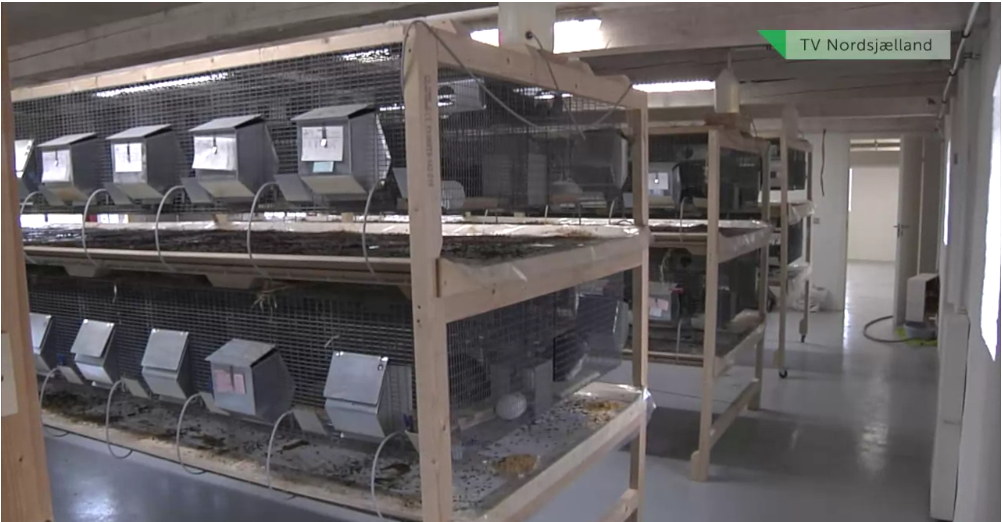
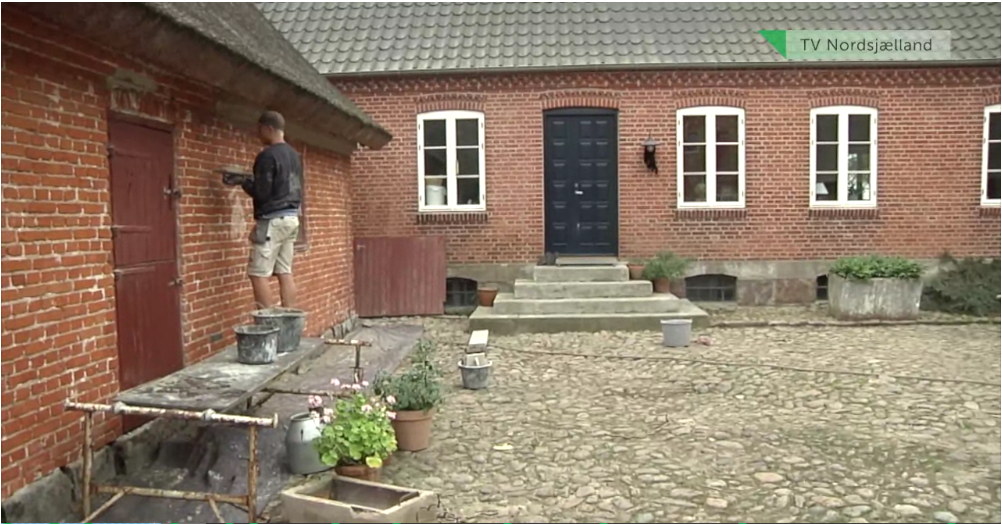
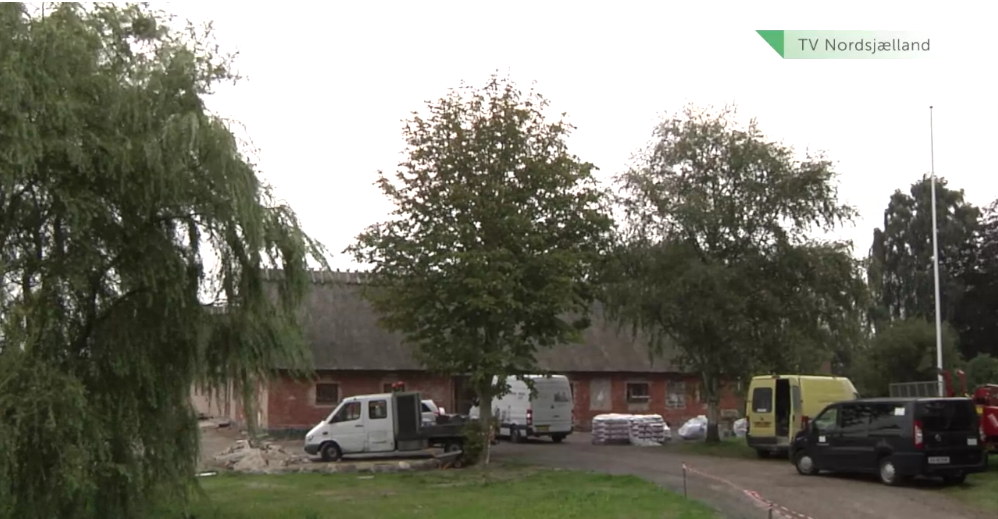
There was also an article (in Danish) about the Chinchilla project in a Danish Farmer’s Magazine (LandbrugsAvisen) in 2014. In the first photo, Ms. Kongstad poses with her dog Hector in front of the farmhouse.
“But the point to remember here is that Kongstad and his wife aren’t making any secret about their Chinchilla project. In fact quite the opposite — they seem to be actively canvassing publicity from various media in Denmark and via Facebook.”We would like to emphasise that we don’t encourage or condone invasions of privacy. But the point to remember here is that Kongstad and his wife aren’t making any secret about their Chinchilla project. In fact quite the opposite — they seem to be actively canvassing publicity from various media in Denmark and via Facebook. So they hardly have any grounds for complaining if their publicised activites attract unwanted attention. We don’t see that as involving any invasion of privacy.
If someone posts photos on their Facebook page then they can hardly complain if they end up being commented on and perhaps reproduced elsewhere (although there might be copyright issues with that).
We are planning a dedicated article on the Chinchilla project so we might like to put out there some of the photos until that is ready. We shall get back to that in the near future.
“Kongstad’s farmhouse residence in Denmark is officially called “Bremelandsgård”.”Regarding Bremelandsgård, the farmhouse above, some additional information reached us only days ago.
Kongstad’s farmhouse residence in Denmark is officially called “Bremelandsgård”. “Gård” is a Danish word meaning farm so the name means “Bremelands farm”. There is a photo of the farmhouse and buildings on Panoramio. That photo was taken in 2011 which is about two years before the Kongstads acquired the property (2013). To see the road entrance to the property on Google Maps (Street View) use this link. █
Permalink
 Send this to a friend
Send this to a friend
Posted in Europe, Patents at 3:42 am by Dr. Roy Schestowitz
Part of a series

Summary: A look at the professional life of the Chairman of the Administrative Council of the European Patent Organisation, including the lesser-known aspects of Jesper Kongstad’s farmhouse/mansion in Denmark (shown above)
Jesper Kongstad is the current Director of the Danish Patent and Trademark Office and Chairman of the Administrative Council of the European Patent Organisation. He is also a member of the Board of the Nordic Patent Institute.
“Kongstad rejected this suggestion and claimed that the redundancies which he defended as “just sound management” were a justifiable reaction to the downturn in applications.”In 2009, Kongstad put his name forward as a candidate for the position of President of the European Patent Office which was due to be filled on 1 July 2010. In December 2009, he withdrew his candidacy allegedly as the result of some kind of secret deal with Battistelli.
Kongstad was subsequently elected as Chairman of the Administrative Council of the European Patent Organisation on June 29, 2010. He took up office on 1 July 2010 for an initial period of three years, which was later extended to six years in March 2013. He was re-elected for a further period of three years in March 2016.
Kongstad has been the Director of the Danish Patent and Trademark Office (DKPTO) since 2003. In 2009 it was reported that the DKPTO had laid off 35 members of staff after seeing a slump in applications due to the global recession. This layoff amounted to somewhere around 15% of the total workforce of the DKPTO. It was criticised is some quarters as “a very drastic approach” and it was suggested that the DKPTO was using the crisis as an excuse to cut certain services. Kongstad rejected this suggestion and claimed that the redundancies which he defended as “just sound management” were a justifiable reaction to the downturn in applications.
“Despite the Scandinavian tradition for transparency and accountability, Kongstad is ironically an outspoken opponent of transparency rules for IP trading.”It’s also interesting to note that during 2009 and 2010 the DKPTO was involved in an EU twinning project with the Croatian State Intellectual property office (SIPO). This is where Željko Topić had worked before he started abusing EPO staff like he did at SIPO.
Despite the Scandinavian tradition for transparency and accountability, Kongstad is ironically an outspoken opponent of transparency rules for IP trading.
From his CV which appears on LinkedIn it can be seen that Kongstad began his professional career in Denmark as an administrative officer in the Ministry for Industry (1984-1990). In 1990 he began working at the Statens Serum Institute where he remained in various roles until 1999. Statens Serum Institute is a public enterprise under the Danish Ministry of Health. After that he switched to the private sector where he was CEO of a biopharmaceutical startup company called Astion A/S.
“He is rumored to have strong connections to the conservative-liberal Venstre party which was in government at that time. It has been speculated that his political connections might have assisted him in securing his position at the DKPTO but this cannot be confirmed.”In 2003 Kongstad returned to the public sector when he was appointed as Director of the DKPTO. He is rumored to have strong connections to the conservative-liberal Venstre party which was in government at that time. It has been speculated that his political connections might have assisted him in securing his position at the DKPTO but this cannot be confirmed.
Some sources alleged that the Kongstad family used to live in a fashionable upmarket suburb of Copenhagen, but the Kongstads did not live directly in Copenhagen as originally believed but rather in Rungsted which is an affluent suburban neighborhood in Hørsholm Municipality on the Øresund coast, north of Copenhagen. In 2013 they suddenly relocated to a farmhouse in Valby, Helsinge in the Gribskov municipality which is situated about 80 km north-west of Copenhagen. The source for this is an article published in February 2014 in a Danish Farmer’s Magazine called “LandbrugsAvisen”. The article is entitled “Fra villa til chinchilla” – From the villa to chinchillas.
According to publicly available data on Danish real estate websites, the house in Valby boasts an impressive 240 square metres of floor space and the property includes around 22 hectares of agricultural land. One recent evaluation put the property value at 4.6 million DKR (about 620k Euros at current exchange rates).
“Whatever about that, the move to the farmhouse has given Kongstad’s wife, Majbritt, the possibility to reinvent herself as a chinchilla-breeder and director of a fur farming operation which was reportedly inspired by a dinner table conversation with Torben Nielsen, the then Chief Executive of Kopenhagen Fur. “In Danish press articles which reported on the Kongstad family’s move from Rungsted to a more pastoral setting in Valby, the move was said to be motivated by a desire for a change in life-style. But some people who have looked into the matter think that there may be more to it than just this. As far as can be determined, the purchase of the farmhouse was financed mostly by credit (mortgage). At the same time, it is unclear what exactly happened to the proceeds of the sale of the previous upmarket suburban house which could have been expected to yield some gains due to the rise in property prices in the Rungsted area over the years. It has been speculated that at least some of the proceeds from the Rungsted house sale might have been used to cover losses in one or more of the various private businesses operated by Mr. Kongstad and his family.
Whatever about that, the move to the farmhouse has given Kongstad’s wife, Majbritt, the possibility to reinvent herself as a chinchilla-breeder and director of a fur farming operation which was reportedly inspired by a dinner table conversation with Torben Nielsen, the then Chief Executive of Kopenhagen Fur.
Note: For those unfamiliar with the fur industry, Kopenhagen Fur is the largest fur skin auction company in the world. Recent research has also uncovered some interesting connections between Kopenhagen Fur and allegations of attempts to buy influence in Danish politics including a donation to the Venstre party which we hope to look at in more detail later on.
In future articles we intend to take a closer look at Mr. Kongstad’s political masters in Denmark and the rumoured connections to the Venstre party. We would also like to examine his various private business ventures and the questions which these raise about potential conflicts of interest. █
Permalink
 Send this to a friend
Send this to a friend
Posted in Europe, Patents at 2:46 am by Dr. Roy Schestowitz
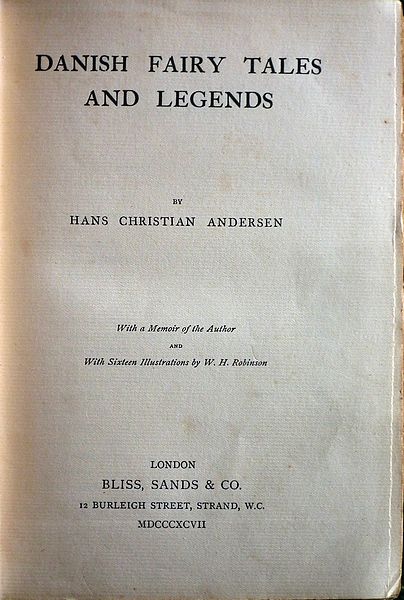
Summary: An introductory post to a series of articles about the Chairman of the Administrative Council at the European Patent Organisation
EVERY once in a while we publish in-depth stories about the EPO. These help both outsiders and EPO insiders better understand how the EPO operates and who operates it. This week we shall look deeper into the professional life of the Chairman of the Administrative Council, Jesper Kongstad. He is not only Battistelli’s successor but also his protector (if not facilitator rather than overseer), as we first pointed out more than 2 years ago.
Some of our contacts have been carrying out research into Mr. Kongstad’s background and they managed to unearth a lot of interesting information. We are in the process of analysing it and we estimate that there would be sufficient material for a series of articles. At the moment our current plan would be to structure the material into five parts along the following lines:
- Introducing Jesper Kongstad
- Kongstad’s political masters
- Kongstad’s private business ventures
- The curious case of Bremelandsgård: Chinchilla fur farming and Kopenhagen Fur
- Fjorblink Medical Apps: a possible conflict of interest?
Please be patient. We hope to be able to publish the first few installments some time this week. As a teaser we provide readers with this link to the publicly accessible Danish Register of Companies Herein, anyone can see a list of companies which are registered at Mr. Kongstad’s home address in Helsinge, which is located on Zealand in Denmark. More to follow soon. █
Permalink
 Send this to a friend
Send this to a friend
10.03.16
Posted in Deception, Europe, Interview, Patents at 4:37 am by Dr. Roy Schestowitz
“There is an old joke which asks – how to tell if a politician is lying? The answer – if they are moving their lips.” (source)
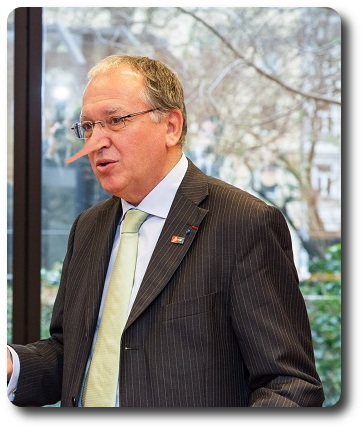
Source (original): Rospatent
Summary: An interview prepared by Battistelli’s department, inclusive of all the ‘official’ narratives, is now translated into English and responded to succinctly (for accuracy and a more complete record of events)
THE EPO‘s President is basically a politician, and like most politicians he habitually lies with apparent sincerity. We recently asked for a translation of an article from Juve, which is essentially a written interview in which Battistelli and his PR people stick their ‘official’ story. We now have a complete translation to which we respond in-line (below the quotes):
Here is the introductory part:
EPO PRESIDENT BATTISTELLI IN INTERVIEW: “I AM DELEGATING RESPONSIBILITIES”
In July, the European Patent Office reformed its Boards of Appeals. This reform must be implemented by the beginning of 2017. To achieve this, a President of the Boards of Appeal has to be found. Critics complain that the reform will not give the EPO Boards enough independence. In this JUVE interview, EPO President Battistelli gives his view and explains why patent renewal fees will not necessarily reduce if the UK leaves the EU and, with it, the new European patent system.
We gave a sort of translation of the mirage of independence for the boards. AMBA later refuted that as well.
Regarding the UK, it does not have to leave the EPO if it leaves the EU as the EPO is not an EU organisation and it includes several member states outside the EU.
JUVE: The Administrative Council and the Office describe the reform of the Boards of Appeal as a milestone for the strengthening of status, efficiency and sustainability of the EPO appeal system. Why?
BENOIT BATTISTELLI: The reform is pioneering because attempts at a structural reform have already failed twice, in 1995 and 2004. The Administrative Council gave the Office the mandate to develop a reform proposal which was within the boundaries of the European Patent Convention (EPC). This allowed, in spite of the scope of the reform, a fast implementation. Because otherwise a protracted process would have been needed, including a diplomatic conference and ratification by the parliaments of all 38 member states.
What he is trying to say is, suddenly he cares about the EPC, even though we showed many times in the past that Battistelli arrogantly defies the EPC.
What “fast implementation” means in this context is a forced implementation that does not allow much time for discussion and potentially resistance (same as in patent appeals). It’s just autocracy. To him, diplomacy is just a nuisance that needs to be overcome. We have seen a lot of this in the UPC.
JUVE: What have you achieved?
BENOIT BATTISTELLI: The Boards of Appeal play a very important role in the European Patent System. The reform shall emphasise that and ensure the sustainability of the EPO appeal system: it strengthens the organisational and managerial autonomy of the boards, the perception of their independence, and their efficiency. In addition, a series of measures will be introduced, that will allow the Administrative Council and the future President of the Boards of Appeal to improve legal proceedings for the parties – for instance, by shortening process times and making the appeal procedures more consistent.
In reality, all that’s being achieved is shrinking of the appeals body, less opportunities to appeal (not to mention less time), higher financial barriers (for access) to appeals and no substantial separation at all, given that Battistelli is, according to Board 28, continuing to attack a judge.
JUVE: Nevertheless, not only EPO Boards of Appeal members have criticised that the emphasis has been too much on efficiency and less on the independence of the EPO Boards. How do you respond?
BENOIT BATTISTELLI: The independence of the Boards of Appeal is clearly incorporated in the EPC, and their role as an independent judicial institution has always been recognised by the highest European and national courts. Therefore, the reform shall primarily improve the perception of independence. To achieve this the current DG3 will be restructured into a Boards of Appeal Unit with its own President. The President of the Boards of Appeal will be given tasks and powers which have been delegated to him by the President of the EPO. As far as management duties are concerned, he is only answerable to the Administrative Council. This is a substantial change. This is because as well as improvements to independence the President of the Boards of Appeal shall also increase the efficiency of the Boards of Appeal.
When Battistelli alludes to the EPC he basically admits that he violates it. Why? Because it’s abundantly clear that he has not respected their independence and continues doing so. He keeps speaking about “perception of independence” perhaps because he knows that he wants to give them no real independence; he’s faking it.
JUVE: Why is this at all necessary?
BENOIT BATTISTELLI: The current backlog and the protracted length of the procedure need sorting out. The continuous increase in litigation in the last couple of decades is, however, in no way only limited to the EPO Boards of Appeal. However, it is necessary to confront this situation with appropriate measures.
In other words, quality control is a nuisance to Battistelli because it means that the whole process is slower and there is a queue. God forbid! He acknowledges an increase in litigation, as though this is desirable or somewhat of a given. So in short, speed and raw quantity (quantified using a dumb politician’s yardstick) trump quality now. It’s quite evident from what he is saying.
JUVE: By having, with the new Boards of Appeal Committee, a joint right of proposal for the new President you will have further influence on the Boards of Appeal. Why is the participation of the EPO President at all necessary in this matter?
BENOIT BATTISTELLI: It is stipulated in the EPC that the Chairman of the Enlarged Board of Appeal shall be appointed by the Administrative Council upon a proposal by the President of the Office. According to the reform, the Office President and Boards of Appeal Committee shall jointly propose the President of the Boards of Appeal, who will be delegated managerial responsibilities. In this way the President of the EPO will share the right of proposal with the Committee – currently he alone has this right. This will allow the President of the Boards of Appeal to lead his unit without influence by the management of the EPO.
Given that the Administrative Council is almost in bed with Battistelli (hardly overseeing him at all), and given the track record of bad faith from both, it seems apparent that the above answer is lots of hogwash and hot air.
JUVE: Once more: why, as Office President, will you continue to participate in these matters?
BENOIT BATTISTELLI: At the end of the day the President is legally responsible for ensuring that the whole Office functions in a proper way, including the budget. Hence, he must be able to trust that the person that takes over his powers exercises them properly. The decision to appoint the President of the Boards of Appeal lies, anyway, with the Administrative Council.
…which in itself is somewhat in the pocket — some believe almost literally — of Battistelli.
JUVE: When will you delegate your powers?
BENOIT BATTISTELLI. As soon as the President of the Boards of Appeal has been appointed I will be able to sign a document to transfer powers.
One can safely assume that Battistelli will have veto power and can therefore ensure that the person is subservient or obedient to begin with.
JUVE: Has it already been decided who the first President of the Boards of Appeal will be?
BENOIT BATTISTELLI: He shall be appointed by the Administrative Council before the end of the year. It is planned that he will take up his duties when the reform comes into effect in January 2017.
Notice the word “he” (maybe an artifact of translation from German). Given the lack of diversity at the Office, it would not at all be surprising if the person turned out to be white male, possibly French and right wing.
JUVE: In the future the Office and the Boards of Appeal shall be separately housed in Munich. Has there already been a decision over the future location of the Boards of Appeal?
BENOIT BATTISTELLI. Negotiations with property owners in Munich are already very advanced and hence the decision can be made in October.
They already decided, but they are playing a game here.
JUVE: The disciplinary procedure against the judge that you suspended has still not been concluded. In June the Enlarged Board of Appeal deviated from the recommendation, by the Administrative Council, of dismissal. By October Jesper Kongstad, Chairman of the Administrative Council, has to draw up a proposal as to how to further proceed. According to the statutes he has to propose that the judge be reinstated. You wouldn’t favour that?
BENOIT BATTISTELLI: According to our Convention the Administrative Council has disciplinary authority over Boards of Appeal members, while the President has the power to suggest disciplinary measures and furthermore carries total responsibility for the proper functioning of the Office. In the case in question the Council decided in December 2014, because of the knowledge of serious misconduct, to suspend the Boards of Appeal member from service. After the submission of an extensive investigation report the Council, in March 2015, initiated a disciplinary procedure. Under the chairmanship of a former ECJ judge, a disciplinary committee, which also had members of the EPO Boards of Appeal and experienced external lawyers, came unanimously to the conclusion that the serious misconduct of the Boards of Appeal member demanded his dismissal. In decisions in June and October 2015 the Council followed this review and requested that the Enlarged Board of Appeal submit a proposal for dismissal. However, almost a year after this request the Enlarged Board of Appeal decided to not follow the request, because I pointed out that at the EPO disciplinary proceedings are confidential and cannot be carried out in public. These are the facts. Let us be clear: this isn’t about personal sensitivities, but the integrity of the appeal system at the EPO.
Complete nonsense. Battistelli’s lips just move a lot.
Regarding confidentiality, it’s quite likely Battistelli and his goons who leaked smears to the media in order to defame the accused, making the Office look worse than bad, one might even say “corrupt”. A short time afterwards they began attacking me too — all this shortly after they had signed the FTI Consulting contract that was later expanded to dominate Dutch and German media (separate from the EPO’s payments to media giants which soon turned into EPO mouthpieces).
JUVE: The Brexit decision endangers the start of the new European patent system. The EPO is involved in this system. What chance do you see that the Unitary Patent and hence the whole system will start in April 2017 as planned?
BENOIT BATTISTELLI: The EPO hopes to find a solution that lets the Unitary Patent come into force as soon as possible. It is here crucial that partaking member states ratify the Agreement on a Unified Patent Court. After the referendum the Dutch parliament agreed to ratification and so sent out an important political signal. Independently from the political decisions it can be assumed that the system will come, albeit very probably with a delay. The work is, however, far too advanced, and has generated too much positive momentum, for it to be shelved.
No, the UPC is almost certainly dead (in its current form), if not just in the UK then in the whole of Europe. They’ll probably try to repackage it and maybe even rename it again. This can take years and there’s no guarantee anything will come out of it. In the mean time, the EPO is rotting and there's expectation of layoffs within a couple of years if Battistelli's vision gets implemented.
JUVE: If the UK can’t take part in the system will the renewal fees for the EU patent have to be recalculated?
BENOIT BATTISTELLI: It is too early to estimate the impact on the renewal fees for the Unitary Patent. They have been so determined to correspond to the sum of the renewal fees for the four countries in which classical European patents are most frequently validated. This so-called “Top 4” solution was preceded by very long and difficult discussions of the member states. By the way, the level of the fees was already decided before the accession of Italy and wasn’t increased afterwards, because the member states didn’t want to reopen the debate. This could also be the case if the UK leaves. Finally, the model would even then still offer excellent value, because it would give patent protection in a multitude of EU member states at a very attractive cost.
The patent trolls would certainly love it, but again, why assume this can ever happen? Why suppose an inevitability? The UPC is about as dead as the EU Patent or Community Patent, which several years ago we were told were inevitable and only a matter of time. Remember Charlie McCreevy‘s and Michel Barnier‘s lobbying for this? The latter, incidentally, became the key person in Brexit negotiations.
At the end of last week IAM remarked on this Brexit update, asking, “lawyers, would this have UPC implications?”
“Depends which lawyers one asks,” I replied. Patent lawyers (especially those who invested in UPC) are not David Allen Green, who writes a lot about Brexit these days (one of the most prominent commentators on the subject in the UK). Incidentally, David Allen Green is the person who defended me from several vicious attacks from the EPO.
“Theresa May,” told us a reader last night, “said at the Conservative Party Conference that after Brexit the UK will be “a fully-independent, sovereign country” that will no longer be in the “jurisdiction of the European Court of Justice”, Bang goes the UPC then!”
“Anybody claiming from now on that UK should ratify the UPC soon should loose their illusions,” wrote another person last night [1, 2]. To quote the full comment:
It has just become known that procedure according to Art 50 will be started fore the end of March 2017.
The European communities act of 1972 will be repelled and a Great Repeal Bill will be decided.
It becomes thus clear that the Brexit is on its way. Any ratification before this date has been transferred to dream world…..
Anybody claiming from now on that UK should ratify the UPC soon should have lost its illusions; it would better think how UPC could progress without UK.
Battistelli is a chronic liar (with a track record to prove it). He said the UPC would be in effect this year (he said this as recently as last year) and he keeps changing his story every time he’s caught in a lie. Don’t believe anything that Battistelli and Team UPC say about the unitary patent system, or whatever they will choose to call next year. █
Permalink
 Send this to a friend
Send this to a friend
10.02.16
Posted in Courtroom, Europe, Patents at 7:58 am by Dr. Roy Schestowitz
The Organisation should be prepared for criticism over its role in this embarrassment of Europe
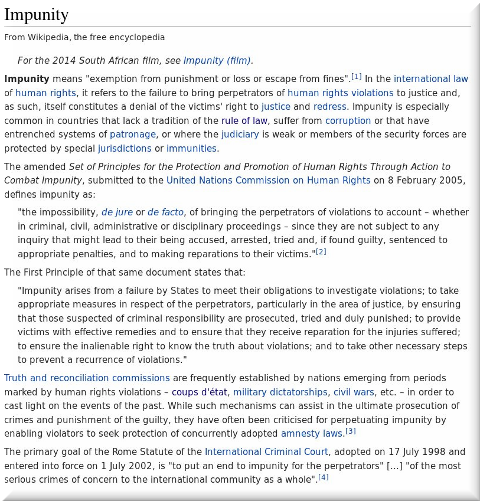
Reference: Impunity
Summary: Impunity at the EPO, a subject of growing fury inside and outside the EPO, is revisited in light of the expectation that Dutch courts won’t hold the EPO accountable, and Board 28 quit caring about the crisis which it itself had admitted
THE EPO is a politically-connected or politically-infiltrated institution. No wonder it’s so abusive. We are going to provide evidence of it in the coming week. The politician/President Battistelli has a 0% approval rating at the EPO, much like politicians (they too have low degrees of public trust). The Board (28) and the Council, who are complicit and largely supportive of Battistelli, are also politically-connected and despite admitting there is "a crisis" at the EPO they do nothing to address it. The Board (28), for example, shows no intent to kick Benoît Battistelli out any time soon. Combine all this with immunity from the outside and what we have is a rogue entity totally above the law, including international law. See our prior (first) post about it. It’s unthinkable that such a thing can be tolerated in the so-called ‘developed’ world.
It does not look like SUEPO is likely to resolve the issue on its own. Here’s a recent new comment (correcting an error):
Obviously, it should have been “and a decision in favour of SUEPO in January look improbable.”
Sorry for that.
This was said in relation to the Dutch “AG [who] forgets that the immunity of the EPO is not absolute according to the PPI,” to quote this other new comment:
Well, IMHO the AG forgets that the immunity of the EPO is not absolute according to the PPI.
It is limited to “within the scope of its official activities” (Art 3 PPI).
Seeing the the EPO is continuoisly violating the PPI (by refusing any negotiations under Art. 20(2)PPI), where does the “scope” of official duties end?
Art 3(4) gives a hint:
(4)
The official activities of the Organisation shall, for the purposes of this Protocol, be such as are strictly necessary for its administrative and technical operation, as set out in the Convention.
Anything outside of the convention is not falling under immunities… And anything in implementing regulations, or other secondary law, is too easily amended, and can therefore not be protected by the claimed immunity grom everything.
There larger issue working against SUEPO is the requirement of the Office not being allowed to be put under restraints in one site, but not in the others. And the Dutch courts jurisdiction does not extend to Munich and Berlin and Bruxelles and Vienna……
Immunity might not be given, but a decision against the EPO may be refused under this requirement.
There is another new comment on the current situation and it makes it clear that people are very much disturbed by the situation at the EPO. We also saw some reactions — some of them quite strongly worded — in sites like Twitter. What the AG has said infuriates some EPO insiders. They’re almost at a loss for words, except very strong words.
We have spent some time researching the potential causes of the immunity of the Office and the Organisation. Some people looked into the family background of Battistelli and also the secret life of Kongstad. In the run-up to the next big meeting we are going to reveal to readers some of our findings. █
Permalink
 Send this to a friend
Send this to a friend
10.01.16
Posted in Europe, Patents at 10:57 am by Dr. Roy Schestowitz
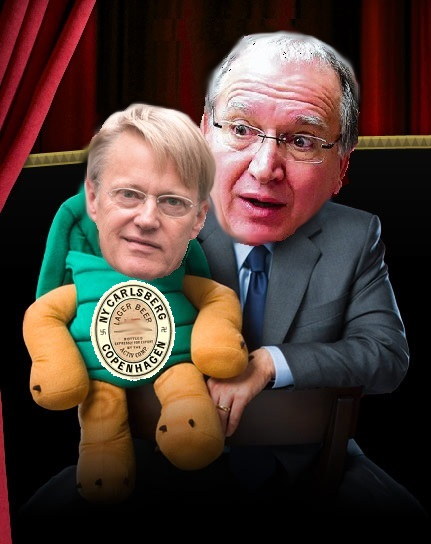
Jesper Kongstad has turned the Organisation into a lapdog -- not a watchdog -- of the Office (autocracy of Kongstad’s predecessor), aiding even unprecedented secrecy around salaries
Summary: In light of remarks from the Attorney General in the Netherlands and in light of some recent and highly disturbing developments (like Board 28 folding for Benoît Battistelli), it is increasingly apparent that the EPO is disconnected from any accountability whatsoever
THE EPO‘s staff supports the staff union a lot more than it supports its own management. In fact, the President has a 0% approval rating. That’s how grim things are. The Board, which is increasingly complicit in all this, admits there is "a crisis".
The Attorney General in the Netherlands now says that the EPO’s staff union cannot hold the management accountable for breaking the law. We had the subject covered here shortly after this had made it into the Dutch media. Shortly afterwards we began seeing comments about it at a very old thread of IP Kat (which stopped its criticism of the EPO after the censorship, perhaps a prelude to legal bullying). We don’t think that many people can see these comments (buried very deep inside the site, under page 2 of a very old article), so we reproduce them below. The first comment said:
hoge Raad: Dutch judges are not allowed to assume responsibility in cases against the EPOrg.
So, immunity upheld. SUEPO cannot file charges against the EPO anywhere, neither nationally or with ATILO (only for employees, not for,staff organisations).
So, what about illegal activities of the national representatives who voted in favour of rules which are illegal in their own country?
This links to this report which says: “De Europese Octrooi Organisatie (EOO) beroept zich in een geschil terecht op immuniteit van jurisdictie. Dat betekent dat de internationale organisatie niet voor de Nederlandse rechter kan worden gedaagd voor geschillen over de officiële werkzaamheden van de organisatie. De Nederlandse rechter is onbevoegd om te oordelen in een geschil tussen het in Rijswijk gevestigde Europese Octrooibureau, een onderdeel van EOO, en de vakbondsunie van het Europees Octrooibureau en de overkoepelende vakbond voor werknemers van EOO. Dat schrijft advocaat-generaal Vlas vandaag in zijn conclusie, een advies aan de Hoge Raad.”
Here is a response to the initial comment:
should’ve read the publication (in Dutch) first, instead of just the headline….
This is the opinion of “an independent expert”. He states that the European Convention on Human Rights does not require access to indpendent courts, and that the internal procedures of the EPO, as well as ATILO, allow sufficient remedies.
Well, the SUEPO does not have access to internal remedies, nor to ATILO….
The new expected date for a decision is 20 January 2017.
Another person gave a direct link to the document and said:
Thanks for the press release.
I will have to digest the actual “opinion” before commenting.
Then came a more detailed comment:
From paragraph 2:19 of the opinion of the Prosecutor (Google translated):
“The mere appeal to an alleged particularly serious breach of a norm of international law, or even a norm of jus cogens claim immunity from jurisdiction can not override . Honoring the claim immunity from jurisdiction by the courts in no way means that they held that infringement of property rights is permissible. It follows that the nature of the substantive rights at issue and the alleged severity of the infringement should not be included in the key or the proportionality requirement is met in the context of determining whether an application should be granted immunity from prosecution. I believe that the component also succeeds in this respect.”
In other word, immunity is absolute, and does not depend from the nature of the infringement.
It is difficult to disagree, and a decision against SUEPO in January look improbable.
I don’t blame the Dutch Government to uphold this principle of International Law though its Prosecutor – yes, when a drunken diplomat kills a little girl with its car immunity is uphold, even in front of public outcry. I note, however, that in general the Diplomat will quietly be asked to leave the hosting state to silence the controversy.
This is the least that the Dutch Government, through the AC, should require from EPO, to not appear to abide the abuses happening there.
But this will never happen, of course, and a decision in favor of battistelli and his regime in January will only embolden him and his clique.
It will be like saying “Here, Mr. battistelli: a blank cheque for you.”
Separate threads, these ones nearly 4 months more recent (hence more visible), still talk about various aspects of lawlessness at the EPO. Consider the following new comment (from today):
The fear of M. Battistelli is that an independent audit checks the real situation at the EPO.
Currently all the numbers are given by M. Battistelli himself without any independent authority to supervise.
What’s worse is, he produces self-commissioned propaganda with which to mislead the supposed ‘overseer’ (now more like “yes men” of Battistelli). Next week we will look a little deeper under the kimono of the Administrative Council and show that the Council too — not just Battistelli — has some skeletons in its closet. We must realise that nowadays the Council and the Board (partly overlapping) are actually complicit in all these abuses. Battistelli has turned both (by various nefarious means) into a lapdog rather than watchdog, in the same way mass surveillance in the US is now regulated or overseen by many of the same people who were responsible for it (revolving doors and private industry conflict of interests is what much of it qualifies as). █
Permalink
 Send this to a friend
Send this to a friend
Posted in Europe, Patents at 10:25 am by Dr. Roy Schestowitz
A self-serving conspiracy of law firms and other facilitators of Big Business

The Democracy Monument
Summary: Some of the latest hints of the vain attitude which EPO managers and UPC-leaning law firms have adopted, as part of their plan to impose the UPC on Europe in spite of public resistance (or apathy due to lack of information and consultation)
“Unitary patent Reduction of annual fees post-Brexit not likely says Battistelli in Juve Interview,” according to the author. We still hope that someone will send us a translation of this Juve piece so that we can address and debunk the claims made by Battistelli in it (automated translations are not reliable and can lead to misunderstandings and errors). We know from experience that a very high proportion of what Benoît Battistelli says is complete lies, sometimes defamatory lies.
“Now that UPC lobbying intensifies we see more clearly that the moral depravity of the EPO expands beyond Eponia and threatens to ‘corrupt’ politicians everywhere in Europe.”“EPO [is] bypassing Parliaments,” Benjamin Henrion said about this interview, quoting: “Because otherwise a lengthy diplomatic conference and ratified by the 38 parliaments” (as if that’s just a nuisance to be overcome).
The EPO under Battistelli’s leadership has been an utter disaster. Everyone we speak to, both inside and outside the EPO, thinks so. Now that UPC lobbying intensifies we see more clearly that the moral depravity of the EPO expands beyond Eponia and threatens to ‘corrupt’ politicians everywhere in Europe. We cannot let this happen.
Watch this latest from Bristows, which is occupying politics in an effort to change the law in its favour. Just before the weekend their staff wrote “Latest news from #BristowsUPC – Call for action on the #UPC,” linking to this page of theirs that says: “The press release from the 3485th meeting of the EU Competitiveness Council of 29 September 2016 records that calls for the swift entry into force of the UPC were made by several delegations [see page 10 here].”
“If the UPC was ever to pass (somehow, even without the UK), it would be a massive blow for the EU, demonstrating utter disregard for democracy.”Bristows has spent spent so much time attacking European and British democracy for the UPC, after it spent a lot of money and effort even rebranding itself “Bristows UPC”. We wouldn’t be surprised it they announced layoffs upon the official collapse of the UPC and even IAM ‘magazine’ publicly disagreed with Bristows, stating in Twitter: “It. Isn’t. Going. To. Happen.”
From the PDF of Bristows we get a glimpse at what they’re pushing for. Patent scope is indeed being affected as according to Henrion, who looked at the document, the “EPO [is] also extending patents to plant breeders, UPC will also rubberstamp that as well…”
This is why we need to urgently put an end to any attempt to resurrect the UPC. It’s not dead until the fat lady sings, as the old saying goes. If the UPC was ever to pass (somehow, even without the UK), it would be a massive blow for the EU, demonstrating utter disregard for democracy. That, in turn, could motivate other nations to ‘pull a Brexit’, motivated in part by the perception that the EU writes laws in secret, often for special interests. █
Permalink
 Send this to a friend
Send this to a friend
09.30.16
Posted in Europe, Patents at 9:46 am by Dr. Roy Schestowitz
Correction: Based on the translation we have received, this is not final yet. See the translation added to the bottom.
Does the 'slayer' Willy Minnoye accept this ruling (because it’s in his favour)?

Summary: SUEPO loses a case against EPO management, but the EPO’s overzealous management was going to ignore the ruling anyway
THE EPO‘s management is so extremely arrogant that it perceives itself as above the law, immune from courts (even at The Hague which is famous for some of its courts), and totally unaccountable. If Eponia was a real nation, it would probably be something like North Korea, where reporting is frowned upon and unhappiness (in public) is barely an option. Dissent is a heinous crime and the Internet is blocked from inside the country ‘for protection’ (like the EPO blocking Techrights).
“Dissent is a heinous crime and the Internet is blocked from inside the country ‘for protection’ (like the EPO blocking Techrights).”Willy Minnoye, speaking on behalf of the EPO’s top-level management, said he would ignore the ruling from the highest Dutch court if it ruled in favour of SUEPO, the Staff Union of the EPO. To say so publicly on Dutch television is to basically insult the citizens of the Netherlands, a host country of the EPO (Minnoye is not Dutch by the way).
“Severe defeat for SUEPO, Union and Labour rights, Human rights in The Netherlands” was reported to us this afternoon after “SUEPO [had] lost the case in cassation!” [sic]
Here is the report about it (in Dutch). Stay tuned as we shall update this article with a manual translation very shortly. █
Update: Petra Kramer has produced for us a translation of the aforementioned article and as far as we are aware, it’s the first English translation of the news (with our highlights added):
AG: Dutch judge unauthorized in dispute between European Patent Office and unions
The European Patent Office (EPO) was right to claim immunity from jurisdiction in a dispute. That means that the international organization can not be brought before the Dutch courts in disputes about the official activities of the organization. The Dutch court has no jurisdiction to adjudicate in a dispute between the Rijswijk-based European Patent Office, a unit of EPO, and the trade union association of the European Patent Office and the umbrella union for employees of EPO. Advocate General Vlas wrote today in his opinion, an advice to the Supreme Court.
A conflict arose between the EPO and the union union of EPO (VEOB) and the umbrella union for employees of EPO (SUEPO). The reason for this conflict are, among others new lines crossed in the service rules of the European Patent Office. VEOB and SUEPO find that the rules restrict the right to strike too much and that EPO should recognize them as social partners in collective negotiating. This case concerns the question whether the granting EPO immunity constitutes an impermissible restriction on the right of access to justice within the meaning of the European Convention on Human Rights.
A preliminary injunction judge dismissed EPO’s claim on immunity but rejected the claims of VEOB and SUEPO – the withdrawal of the strike rules and recognition as social partners. According to the court VEOB and SUEPO can address their demands to the central organization. On appeal the court also ruled that EPO can not rely on immunity. The court upheld the claims of the unions. Against this judgment the EPO brought an appeal in cassation. The State supports the position of EPO as intervener. According to the Minister of Justice, the State need to abide by agreements on immunity of international organizations.
Advocate General Vlas states that the right of access to justice in accordance with the European Convention on Human Rights is not absolute. According to Vlas, VEOB and SUEPO’s rights must be sufficiently guaranteed by the EPO in existing internal dispute procedure with an appeal of individual employees and employee representatives at the Labour Tribunal of the International Labour Organisation in Geneva. The core of the right of access to justice guaranteed by the European Convention on Human Rights is therefore not affected, says Vlas.
A conclusion is an independent, non-binding, legal opinion to the Supreme Court. The Advocate General is a member of the Public Prosecutor at the Supreme Court. The prosecutor at the Supreme Court is an autonomous, independent part of the judicial system. It does not belong to the Public Prosecutor.
It is expected that the Supreme Court will deliver its verdict on 20th January 2017.
Permalink
 Send this to a friend
Send this to a friend
« Previous Page — « Previous entries « Previous Page · Next Page » Next entries » — Next Page »
































 Content is available under CC-BY-SA
Content is available under CC-BY-SA